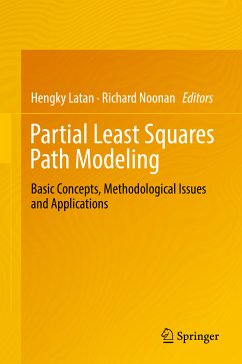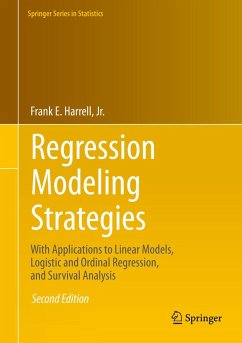
Handbook of Partial Least Squares (eBook, PDF)
Concepts, Methods and Applications
Redaktion: Esposito Vinzi, Vincenzo; Wang, Huiwen; Henseler, Jörg; Chin, Wynne W.

PAYBACK Punkte
176 °P sammeln!
The "Handbook of Partial Least Squares (PLS) and Marketing: Concepts, Methods and Applications" is the second volume in the series of the Handbooks of Computational Statistics. This Handbook represents a comprehensive overview of PLS methods with specific reference to their use in Marketing and with a discussion of the directions of current research and perspectives. The Handbook covers the broad area of PLS Methods from Regression to Structural Equation Modeling, from methods to applications, from software to interpretation of results. The Handbook features papers on the use and the analysis ...
The "Handbook of Partial Least Squares (PLS) and Marketing: Concepts, Methods and Applications" is the second volume in the series of the Handbooks of Computational Statistics. This Handbook represents a comprehensive overview of PLS methods with specific reference to their use in Marketing and with a discussion of the directions of current research and perspectives. The Handbook covers the broad area of PLS Methods from Regression to Structural Equation Modeling, from methods to applications, from software to interpretation of results. The Handbook features papers on the use and the analysis of latent variables and indicators by means of the PLS Path Modeling approach from the design of the causal network to the model assessment and improvement. Moreover, within the PLS framework, the Handbook addresses, among others, special and advanced topics such as the analysis of multi-block, multi-group and multi-structured data, the use of categorical indicators, the study of interaction effects, the integration of classification issues, the validation aspects and the comparison between the component-based PLS approach and the covariance-based Structural Equation Modeling. Most chapters comprise a thorough discussion of applications to problems from Marketing and related areas. Furthermore, a few tutorials focus on some key aspects of PLS analysis with a didactic approach. This Handbook serves as both an introduction for those without prior knowledge of PLS as well as a comprehensive reference for researchers and practitioners interested in the most recent advances in PLS methodology.
Dieser Download kann aus rechtlichen Gründen nur mit Rechnungsadresse in A, B, BG, CY, CZ, D, DK, EW, E, FIN, F, GR, HR, H, IRL, I, LT, L, LR, M, NL, PL, P, R, S, SLO, SK ausgeliefert werden.













